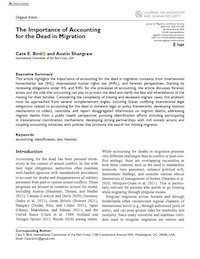By Josiah Heyman
US political discourse characterizes the US-Mexico border as a site of threat and, of necessity, exclusion. This frame ignores the importance of borders to economies, families, and culture in our increasingly interconnected world. Moreover, it leads to policies that place people at risk of victimization and death. In conceiving of the border solely in terms of exclusion, nations forego the opportunity to strengthen relationships across borders. This paper argues that the politics of humane migration require a vision of borders as sites of encounter, engagement, and relationship, rather than solely exclusion. This reconceptualization of the US-Mexico border, in particular, would strengthen relationships across borders, and prioritize cooperation between Latin America/the Caribbean and the United States, starting with regulated legal flows. It would also respond to the shared contexts of migration, including contraband in arms and drugs, criminal violence, and climate change. It articulates an alternative vision of borders as a “commons” in which mutual needs can be addressed (a commons is an issue or resource in which every one has access and involvement). Migration itself provides a perfect example of such a need. It takes place in a political climate partially but powerfully shaped by racism and classism. Thus, it has become a polarized “issue” that appears insolvable. In fact, it may not be a problem at all. Rather, in our current demographic-economic situation, as well as for our cultural well-being, migration should be treated as an asset. Insofar as it needs to be addressed, this paper delineates many possibilities. The options are not perfect and magical — the challenges are hard and diverse — but they an advance a vision of a shared cross-border space on migration. That might be a crucial move, not only for migration, but along a path that recognizes relationships and commitments of many kinds across the hemisphere and world. Recognition is not enough; real change in resources and power needs to follow. But a vision of connection rather than exclusion provides the political starting point needed for change to happen. In every political instance in which borders are used to frame migration in terms of who, how, and how much to exclude, connectedness loses ground. A politics of humane migration can only emerge if rooted in a positive vision of borders as sites of engagement and encounter.
Journal on Migration and Human SecurityVolume 12, Issue 3, September 2024, Pages 321-331





